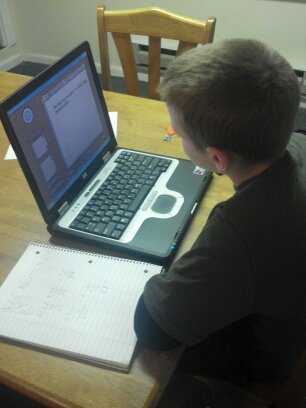5 Tips for the Math-Anxious Mom
Teaching math to your kids can be a homeschool dream – or a sheer nightmare. But it doesn’t have to be! Encourage your kids to have a love of math, even if you don’t. Try out some of these tips for teaching homeschool math. By knowing these simple tips, your kids can go from math-phobic to math-enthusiasts!

images by: stockimages and phaitoon
1. Don’t let your experiences rub off on your kids.
When I taught high school, I used to hear this statement frequently at parent-teacher conferences… “Well, I’m not surprised Billy doesn’t understand math. I hated it when I was a kid, and now he does too.”
Not true. Simply not true.
You see, I was one of those kids who didn’t get math. As in, I never understood it. Never. Nada. Math was just a bunch of numbers and letters in weird patterns.
Yet, I became a math teacher at one of the most elite public high schools in the country. And now, besides homeschooling, I also teach college math courses. (The transformation from being math-awful to awesome is a whole different post!)
How does this relate to you? Well, don’t let your feelings, insecurities, and lack of enthusiasm for math get passed down to your kids. Just because you didn’t like math (and you probably had a horrible teacher in the process who created those bad memories) doesn’t mean that your kids should immediately think negative thoughts whenever they hear the word “equals” or “algebra.”
2. Throw out the timer.
My son loves competition. He’ll race just about anyone, to see who can finish putting their seatbelt on first, who can get dressed the quickest, or who can fill up their squirt gun the fastest.
But he doesn’t like timed math drills.
In fact, it causes panic. And honestly, I remember when I was his age how terrified I was that I wasn’t going to finish all 100 of those addition problems in 5 minutes. Timed tests are torture for just about everyone.
One of the biggest suggestions I can give you is to get rid of the timer. It causes math anxiety, and oftentimes, the beginnings of test anxiety. Instead, I would focus on understanding math… Does your child understand the “how” and “why” behind the facts? How about borrowing/carrying, which is much more than placing a 1 over top of the next column. If you must practice drills, then let your son or daughter set the goal, and make sure it is achievable — maybe 2 minutes initially for 20 simple problems. Each time the goal is broken, readjust the goal to a lower time.
3. Step away from the flashcards.
Flashcards. What parent doesn’t try to drill their kids with flashcard facts? It’s painful for both the parent AND the child. Your daughter guesses what she believes is the right answer, and then waits for your approval that she got it correct. Guess correctly… whew! Guess wrong… *sigh* and place the card in the back of the deck.
It doesn’t have to be that way!
You are trying to encourage memorization, but are you really helping? Not really. Instead, it’s building a sense that math is only memorization.
So, instead, build understanding!
In order to do this, use lots of hands-on manipulatives. I know it sounds like something you would do only with a PreK kid, but it’s actually useful for building connections and understanding for all ages. It also helps to visually understand how the numbers relate to the “rules” that we’re giving them. There’s not a single day that goes by that I don’t do some type of hands-on demonstration with my son.
Need some examples, try this post about my picks for must-have math manipulatives.
4. Make it fun, not a chore.
My son loves to play games. In fact, it doesn’t have to be a game… he just loves to play. That’s why I build almost all of our instruction around some type of fun way of learning. It engages him in the learning process. Somehow, this makes it click for him. That’s fine with me. Learning while having fun — nothing better!
Since we love to play games, here’s the top 25 math games that I recommend for elementary math.
Looking for a game-based math curriculum, try RightStart Math. Almost every lesson contains a game! We use it in our homeschool, and my son LOVES it!
5. Make it real.
A few days ago, my son and I were out grabbing a bite for breakfast. The cashier handed him the change for our purchase. He started thinking about the coins in his hand, and how much more he needed to make a dollar.
He then asked me, “Mom, how many quarters are in five dollars?”
I asked how many quarters were in a dollar.
Four.
Great. Let’s draw 5 dollars, and then add 4 quarters in each dollar. So, how many quarters are there total.
At that moment, he then realizes, “Mom, that’s makes four times five. That’s 20!”
Within ten minutes he had completed 2 entirely different math problems, and I didn’t instruct him in any of it.
Why is this so important? This demonstrated that he understands that math is more than just numbers he’s learning to add or subtract. It relates to him and his everyday life! This is an important skill, because if a child understands how math relates to him, he’s more likely to use it in life. If he’s more likely to use it, then he will want to learn more about it.
How many times have you heard, “When am I ever going to use this?” If we teach math so that it is separate from everything else that we do, then our children will not learn how it relates to their lives.
If you struggle with making the real world connections with math, add in books that relate to math topics, such as…
- Spaghetti and Meatballs for All for basic math facts
- Mystery Math: A First Book of Algebra for learning how to solve a simple equation for an unknown
- Sir Cumference and the Dragon of Pi for geometry
- Full House: An Invitation to Fractions for fractional parts.
Do you struggle with teaching math? What’s your biggest struggle with teaching math to your kids? Do you have other tips for teaching homeschool math? I’d love to hear what you do as well!











I’ll have to check out those books. My son is only 4, but I’ve been going crazy trying to find a math curriculum that would suit him. We have been doing a few math books. I’ll be sure to add those to our list. 🙂
These are great book suggestions! I hated math (and still do, quite frankly) and need to make sure my anxiety doesn’t rub off on my children. We love literature for learning so these are now on my list. Thank you!